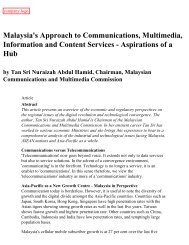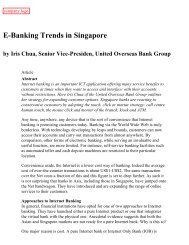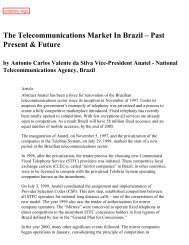Authors include: - Connect-World
Authors include: - Connect-World
Authors include: - Connect-World
You also want an ePaper? Increase the reach of your titles
YUMPU automatically turns print PDFs into web optimized ePapers that Google loves.
IP networks<br />
IP – the new universal language for communication networks<br />
by Thomas Mock, Senior Vice President, Strategic Planning Ciena Corporation<br />
As traditional voice services shift to VoIP and broadcast television toward IPTV, the<br />
migrationtoIPischangingthefaceofallcommunications.By2009,nearlyeveryphone<br />
callmadeintheUKwillbeoverIP.AnIP-basedinfrastructure,inadditiontolowercost<br />
calling,providesmanyotheradvantagesthanworldwidetelephonenumberportability.<br />
Thereare11millionpeoplegloballyusingVoIP–twicethoseninemonthsago–andan<br />
increasingnumberofoperatorsandserviceproviderssupporttheseservices.<br />
ThomasMockiscurrentlySeniorVicePresident,StrategicPlanningforCienaCorporation.Inthisrole,<br />
he is responsible for defining Ciena’s LightWorks Architecture and supporting product definition,<br />
requirements,strategyandmarketingofCiena’sportfolioofnetworkingsolutions.Beforeassumingthis<br />
position,MrMockservedastheCompany’sVicePresidentofPortfolioManagementandpreviouslyas<br />
Senior Director of Product Management. He was also Product Marketing Director for Ciena's Short<br />
HaulandAccessproductlines.MrMockjoinedCienaastheInternationalProductMarketingManager.<br />
BeforeCiena,hemanagedtheproductdevelopmentorganisationforaT1multiplexercompany.<br />
ThomasMockreceivedhisBSEEfromtheGeorgiaInstituteofTechnology.<br />
Theturbulenceinthetelecommunicationsindustryinrecentyearshasbeen<br />
dramatic. Despite the challenging<br />
market environment, technologies<br />
havecontinuedtodevelopatanastonishingpace,andthepersistentgrowth<br />
of broadband services has driven a<br />
shiftinnetworkinfrastructure.<br />
As businesses progress to keep up<br />
with the market and new services,<br />
companies like BT with its 21st<br />
Century Network are positioning<br />
InternetProtocol(IP)tobecometheuniversallanguagefortelecommunications.<br />
IP enables the convergence of voice,<br />
data and video services onto a single<br />
network.Astraditionalvoiceservices<br />
shift to Voice over IP and broadcast<br />
televisiontowardIPTV,themigration<br />
toIPischangingtheinterfaceofcommunications<br />
for all users, from businessestogovernmenttoconsumers.<br />
The rise in deployments of IP networkshasledtosomepredictionsthat<br />
by2009nearlyeveryphonecallmade<br />
intheUKwillbeoverIP.<br />
Growthincommunicationstechnology,<br />
attributed to the Internet and<br />
advanced services like broadband, is<br />
leadingthemarkettohungerforfaster<br />
connectionspeeds,greaterbandwidth<br />
andadditionalservicessuchasVoiceover-IP<br />
(VoIP), IPTV (Internet<br />
Protocol Television) and Video on<br />
Demand (VOD). As the adoption of<br />
thesenewservicesandotherapplications<br />
rises, so does bandwidth consumption.<br />
The older ‘legacy’ systems, designed<br />
when voice traffic and revenue predominated,notbasedonIPtechnology,arestrugglingtokeepupwiththe<br />
services users demand. In response,<br />
service providers are employing IP,<br />
originally created as a method for<br />
best-effort communication between<br />
computers, support more efficiently<br />
andreliablytothemountingnumber<br />
of diverse telephony, television and<br />
mission-criticalbusinessapplications.<br />
MigratingtoIPdoesnotmeanacompletechangeinacarrier’sserviceportfolio.<br />
They will still need to offer the<br />
sameoldtelephonyservicestheyhave<br />
alwaysprovided.Unlikethetelevision<br />
broadcasting standard, which will<br />
switchover to digital broadcasting by<br />
government decree by December<br />
2012, carriers and service providers<br />
cannot force their customers to<br />
change their voice services.<br />
Businesses and residential customers<br />
alike purchase voice service based<br />
upon cost, performance and/or customerservice.<br />
In essence, the migration to IP lets<br />
endusersreceivetheircurrentservices,<br />
but gives them the option to use<br />
new advanced offerings from their<br />
suppliers,nomatterhowtheyareconnectedtothenetwork.<br />
Maintaining traditional services as<br />
theyturnoffpartsoftheirnetworkto<br />
build new infrastructure is a huge<br />
undertaking for the carriers. By<br />
migrating to IP, operators can<br />
upgrade their networks to handle<br />
advancedserviceswhilstmaintaining,<br />
withnodifferencefortheenduse,traditionalvoiceservices.<br />
15

















